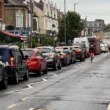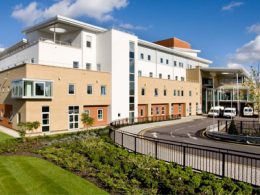Hundreds of doctors may walk out of St George’s Hospital and Queen Mary’s Roehampton for five consecutive days from tomorrow, forcing operations and appointments to be rescheduled as winter flu cases rise earlier than usual.
Resident doctors – formerly known as junior doctors – will strike from 7am on Friday 14 November until 7am on Wednesday 19 November in the 13th round of industrial action since March 2023.
The British Medical Association is demanding a 26% pay rise to restore pay to 2008 levels, arguing resident doctors have experienced a 21% real-terms pay cut due to below-inflation awards. The union has recently narrowed this to asking for “just a pound an hour” gradual increase over four years.
The government says resident doctors have already received a 28.9% pay rise across three years, with 5.4% this year – the highest increase across the public sector – and insists it “cannot go further on pay this year.”
The dispute also centres on a training places crisis. The BMA says as many as 30,000 doctors are applying for around 10,000 specialty training places, with a third of resident doctors in a recent survey reporting no substantive employment secured after their current placement.
BMA resident doctors committee chair Dr Jack Fletcher said talks with Health Secretary Wes Streeting in October failed to produce “a credible plan on jobs or pay”, adding: “Half of second year doctors in England are struggling to find jobs, their skills going to waste whilst millions of patients wait endlessly for treatment, and shifts in hospitals go unfilled.”
Preparing for disruption
Putney’s local hospital trust, St George’s, says it is preparing for similar participation to July’s strikes, when an average of 211 resident doctors across the St George’s, Epsom and St Helier hospital group were absent each day. Members are not required to inform the trust in advance if they plan to strike.
During July’s five-day walkout, St George’s rescheduled 100 operations and 531 outpatient appointments, while Epsom and St Helier rescheduled 44 operations and 553 appointments.
Dr Richard Jennings, Group Chief Medical Officer, warned the strikes come at a challenging time: “Our hospitals are always very busy at this time of year, and unfortunately this – combined with a rise in flu infections and the upcoming strikes – is putting our services under significant pressure.”
National hospital admissions for flu stood at 3.8 per 100,000 people last week, up from 2.4 the previous week, according to UK Health Security Agency figures.
Consultant doctors and other staff will work extra shifts to maintain emergency care, but the trust says services will “inevitably be impacted” with appointments rescheduled to prioritise the sickest patients.
What patients should do
If you have an appointment: Attend as usual unless the hospital contacts you directly about changes.
For emergencies: Still go to A&E or dial 999 for life-threatening situations.
For non-emergency health needs:
- Use NHS 111 online (available 24/7)
- Visit a pharmacy for advice on minor illnesses like coughs, colds and sore throats
- Contact your GP – these services are not affected by strikes
Dr Jennings added: “With flu cases spiking, there is no time to delay. If you are eligible, get the jab to protect yourself from becoming seriously unwell and help us keep our patients safe this winter.”
More information on winter vaccinations: nhs.uk/wintervaccinations









